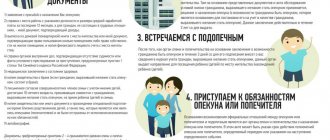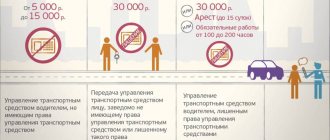Responsibilities of parents to raise children
The rights and responsibilities of parents in the upbringing and education of children are regulated not only by domestic legislation, but also by the UN International Convention on the Rights of the Child.
Any person tries to convey to his child the simple truth that he must be responsible for his actions and actions. True, often even parents forget that they must bear their own responsibility for their own children, and deliberately shift personal responsibilities to teachers, educators or the children themselves.
Article 63 of the RF IC discusses the main responsibilities of parents that relate to the upbringing and educational processes. In accordance with the established provisions, parents are responsible for the upbringing of minors. Therefore, first it is necessary to clarify what the term “parental responsibility for upbringing” itself includes. This concept consists of several main points:
- Caring for the comprehensive development of the child, and in particular, in the spiritual, psychological and physical aspects. Parents undertake to provide the child with the opportunity to receive a general education, and all children are required to attend educational institutions;
- Protecting the interests of the child. Parents act as official representatives of the interests of their own child before the law. Therefore, when the need arises, they are obliged to defend his interests and protect his rights;
- Security. In accordance with this point, parents must provide the child with a safe environment for development and life, without using physical punishment and moral pressure as tools of control;
- Financial support for the child. Until the child reaches the age of majority (18 years), the parents are obliged to support him;
- Child education. In this category, special attention should be paid to the responsibility of parents for the behavior of their children, since their educational process will subsequently be reflected in the child’s behavior not only in the family, but also in society.
The Convention on the Rights of the Child, as well as internal regulations of Russian legislation, stipulate that the primary responsibility for raising children lies with the parents, and the interests of the child must come first for his father and mother.
If it is established that the duties of the parents are not fulfilled properly or that there is a violation of the rights of the child, then in this situation the responsibility of the parents may become legal. Almost every segment of the law has provisions that regulate the responsibility of parents to their children:
- Civil legal framework (Article 1073-1075 of the Civil Code of the Russian Federation);
- Administrative law (Article 5.35 of the Code of Administrative Offenses of the Russian Federation);
- Family law (Article 69, 73 of the RF IC);
- Criminal legislation (Article 156 of the Criminal Code of the Russian Federation).
The provisions and standards listed above provide for measures of parental responsibility for improper performance of personal responsibilities in relation to their own children.
KOMPAS Manual on Human Rights Education with Youth Participation
(Unofficial statement)
The Convention on the Rights of the Child (CRC) has the widest international recognition of any human rights document, with every country in the world ratifying it except two. The Convention brings together the full range of human rights – civil, political, economic, social and cultural rights – relevant to children in one document. The Convention was adopted by the UN General Assembly on November 20, 1989 and entered into force in September 1990.
Article 41 of the Convention sets out the human rights that every child under 18 years of age has and which must be protected and respected.
Article 1
Considers “every human being under 18 years of age” to be a child unless, according to the law of the country, the age of majority is reached earlier.
Article 2
All rights provided for in this Convention are guaranteed to every child without any discrimination.
Article 3
In all actions concerning children, the best interests of the child shall be a primary consideration.
Article 5
States Parties respect the responsibilities, rights and obligations of parents and extended family members.
Article 6
Every child has an inalienable right to life.
Article 7
The child has the right to a name and to acquire a nationality, as well as the right to know his parents and the right to be cared for by them.
Article 8
The child has the right to preserve his individuality and to citizenship.
Article 9
A child has the right not to be separated from his or her parents unless the competent authorities, pursuant to a court decision, determine that such separation is necessary in the best interests of the child.
Article 12
The child has the right to express his or her own views on all matters affecting the child, and the child's views are given due weight.
Article 13
The child has the right to freely express his or her opinion; this right includes the freedom to seek, receive and impart information and ideas of all kinds.
Article 14
The child has the right to freedom of thought, conscience and religion.
Article 15
The child has the right to freedom of association and freedom of peaceful assembly.
Article 16
No child shall be subject to arbitrary or unlawful interference with his or her privacy, family life, home or correspondence, or to unlawful attacks on his or her honor and reputation.
Article 17
States Parties shall ensure the child's right to access information and materials from a variety of national and international sources.
Article 18
Parents bear the primary responsibility for the upbringing and development of the child.
Article 19
States Parties shall take all necessary legislative, administrative, social and educational measures to protect the child from all forms of physical or psychological violence, insult or abuse, neglect or neglect, abuse or exploitation.
Article 24
The child has the right to benefit from the most advanced health services and means of treating illness and restoring health, with priority given to the development of primary health care.
Article 26
Every child has the right to benefit from social security.
Article 27
Every child has the right to a standard of living adequate for his physical, mental, spiritual, moral and social development.
Article 28
The child has the right to education. To this end, participating States shall introduce free and compulsory primary education and encourage the development of various forms of secondary education, both general and vocational, and ensure its accessibility to all children. School discipline must be maintained through methods that reflect respect for the human dignity of the child. Education should be aimed at developing the personality, talents and mental and physical abilities of the child, instilling respect for human rights and fundamental freedoms, preparing the child for a conscious life in a free society in the spirit of understanding, peace, tolerance, equality, and instilling respect for the natural environment .
Article 30
The child has the right to enjoy his own culture.
Article 31
The child has the right to rest and leisure, the right to participate in games and recreational activities and to freely participate in cultural life and the arts.
Article 32
The child has the right to be protected from economic exploitation and from performing any work that may pose a danger to his health or serve as an obstacle to his education, or be harmful to his health and development.
Article 33
Children have the right to protection from illegal drug use.
Article 34
States Parties undertake to protect the child from all forms of sexual exploitation and sexual abuse, the use of children in prostitution or other unlawful sexual practices, pornography and pornographic materials.
Article 38
States Parties undertake to take all possible measures to ensure the protection and care of children affected by armed conflict.
Article 40
Every child who is accused of an offense or crime is guaranteed the presumption of innocence until proven guilty, legal assistance in preparing and conducting his or her defense, freedom from being forced to testify or admit guilt, and full respect for his or her privacy. life, as well as treatment taking into account his age, circumstances and wealth. Children under 18 years of age cannot be sentenced to death or life in prison without the possibility of parole.
The full text of the convention and additional protocols is available on many Internet sites, including the UNICEF page (https://www.unicef.org/crc/)
Source: UN Center for Human Rights and People's Movement for Human Rights Education: www.pdhre.org
The right of parents to educate their children
An important component of the educational process, as a result of which a child is formed as a person, is his receipt of general education. The responsibility of parents to ensure their children the right to receive a quality education is enshrined in the Constitution of the Russian Federation (clause 4 of article 43).
In accordance with paragraph 2 of Article 63 of the UK, a constitutional norm was legitimized regarding the current responsibilities of parents to ensure that their descendants receive a general education. In addition, it is assumed that education must necessarily ensure the formation in every child of an adequate picture of the world, which corresponds to the modern level of knowledge. This will help shape the child’s personality and provide modeling of a behavioral model that will be acceptable not only for the family, but also for society as a whole.
Education itself is directly aimed at achieving such main goals as:
- Personality development and the formation of normal child behavior in society;
- Development of personal talents and recognition of the child’s abilities;
- Instilling in a child the concept of respect for human rights and fundamental personal freedoms;
- Forming a respectful attitude towards the culture and traditions of not only your country, but also all countries of the world;
- Development of a normal respectful attitude towards basic legal norms;
- Preparing the child for a conscious life in terms of mutual equality and respect;
- Thrifty attitude towards nature.
General education is compulsory, and if parents are unable to ensure the fulfillment of this right, then in accordance with current legislation they may be held liable. It is worth clarifying that the right of parents to choose an educational program is considered unquestionable. Consequently, it is the parents who decide how their children will receive general education - in special educational institutions or at home.
Transferring a child to other relatives
The main responsibility of any parent is to ensure the educational and educational process for their own children. If for some reason the parents do not ensure the observance of the child’s rights, then they may be deprived of them, and the child will be transferred to the responsibility of close relatives who will act as guardians, foster families or the state.
According to the law, the transfer of a child to be raised by other relatives can only be carried out in relation to those children who were left without guardianship and trusteeship from their own parents. Often, this arises in situations where parents have been deprived of their existing parental rights, or for some reason are unable to fulfill their obligations towards the child.
The biological parents have the priority right to raise a child. And if they are deprived of this right, then the responsibility for raising and educating children can be assigned to their closest relatives, but only with their written consent and permission from the guardianship and trusteeship authorities.
If the child is currently being transferred to relatives for upbringing, then it is worth understanding that the fundamental rights and freedoms of the child do not disappear anywhere, and all responsibilities in relation to the minor will be transferred to his guardians.
Regarding the issue of material support, when transferring a child to close relatives, they are responsible for the full provision and maintenance of the child. However, according to the law, guardians have the right to receive financial assistance from the state.
It is worth noting that the transfer of a child to another family cannot be done unilaterally. This is possible only at the request of the guardianship and trusteeship authorities, at the written request of the guardians and with the help of the courts. It is the court that will make the final decision and confirm the transfer of parental responsibilities to the guardian.
Convention on the Rights of the Child
The UN Convention on the Rights of the Child is a specialized legal document that plays an international role and predetermines the rights of minor children that must be guaranteed in the countries participating in the signing of the document. All UN countries except the United States took part in the document signing process. The UN Convention on the Rights of the Child is a basic normative act that covers the full range of legal guarantees for minors.
The UN Convention on the Rights of the Child includes 54 articles that detail the individual freedoms and rights of all citizens, whose ages can range from birth to 18 years (the age of majority may vary in different countries).
The UN Convention on the Rights of the Child, its first part, completely deciphers the concept of the word “child”, and also regulates the primacy of interests and basic rights and freedoms of children. The second part of the document, the UN Convention on the Rights of the Child, clarifies the features of the structure and functions of the Committee on the Rights of the Child, and also entrusts state bodies with the task of implementing the decisions of this institution. The third part of the UN Convention on the Rights of the Child sets out ways to resolve various procedural legal problems by public authorities that arose in the process of applying the articles of this document.
The UN Convention on the Rights of the Child was drafted in accordance with basic democratic principles, including:
- Absence of any kind of discrimination. The UN Convention on the Rights of the Child prohibits neglect of a child on various individual grounds: nationality, language, religious preferences, ethnic origin and social status, health status, political views and personal preferences;
- Supremacy of interests. The UN Convention on the Rights of the Child regulates the observance of the interests of minors in the process of making any decisions that affect the lives of children;
- The highest quality of life, development and protection. Society and government agencies must guarantee minors the full realization of their physical, social and spiritual potential;
- Every possible participation in the life of the younger generation: parents, adult citizens and government authorities must constantly participate in making any decisions, as well as ensure that opinions are taken into account when deciding the future fate of young citizens.
The UN Convention on the Rights of the Child guarantees minors the opportunity to receive free basic education. To implement the goals of the document, government bodies of the participating countries must develop various types and levels of the educational system. The UN Convention on the Rights of the Child also includes articles on raising children in the family. The process of raising children must be controlled by parents or legal guardians, who must fully comply with all the requirements and interests of the child.
The international convention, which clarifies the basic rights and freedoms of children from the countries participating in the signing of the document, is an innovative solution to the problem of the full realization of the younger generation. Many of the rights in this document were introduced for the first time, so compliance with the basic articles of the convention ensures the full development of the personal and physical qualities of children, worthy education of respect for society and the environment.
History of the Declaration and its definition
The International Declaration of the Rights of Children is an official document adopted by the international community, which sets out the responsibilities of an adult towards a child.
The first version of the Declaration was adopted in 1924. It consisted of five main points and provided for the protection of children from prostitution, trafficking and slavery. For the UN, this was a major advance in the transformation of international laws. But still minors needed more protection. Later, some improvements and changes were made to the Declaration.
The revised Declaration came into force in 1959. In the new version, there were more main points that protected the rights of children; they already affected many other areas. The measure of liability for violations was also prescribed.
General compulsory education
In accordance with the main constitutional norms and basic legislative provisions, all citizens of Russia have the right to receive general education. This right comes to everyone in childhood, and must be ensured by the child’s parents.
In accordance with the Law “On Education in the Russian Federation,” primary, basic and secondary education is considered compulsory. Thus, in accordance with this standard, all children are required to go to school and receive a general education, and their parents are obligated to monitor the implementation of this right.
At the same time, the law provides that it is parents who have the right to decide how their children will receive the basics of education. According to the decision of the parents, the child can receive education at home or in public or private educational institutions. It is worth noting that home schooling must be agreed upon with the guardianship authorities so that no difficulties arise in the future.
Author of the article
Validity of the document in Russia and date of entry into legal force
On September 15, 1990, the Convention came into force in the USSR and received the status of law. As the legal successor of the USSR, Russia recognizes this agreement, retains its status as law and undertakes to ensure the implementation of the principles and provisions defined by the agreement.
The Russian Federation regularly submits mandatory reports to the Committee on the process of implementing the provisions defined by the Convention.
Thus, the Convention has not lost its original meaning for society, but, on the contrary, has preserved and increased it.







